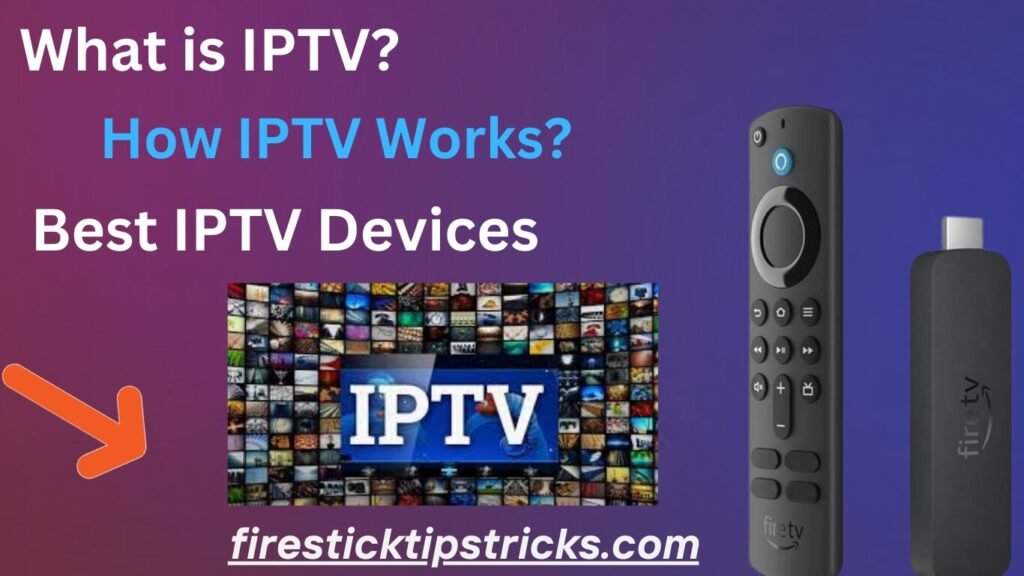Would you like to know more about what IPTV is? In this blog post, I will explain: What is IPTV? How does IPTV work? The best IPTV devices. Also covered: the various providers, solutions, and everything else you could want to know!

What is IPTV?
Internet Protocol Television is known as IPTV. When television content is transmitted via an Internet Protocol (IP) network as opposed to conventional satellite or cable television formats, it is referred to as such. It is capable of delivering both live and on-demand content.
Users using IPTV can access a variety of media items, including movies, TV shows, and live TV stations. All they need is an active connection to the Internet. As a result, viewers can use apps or software that enable IPTV services to watch their favorite shows on a variety of devices, including TVs, PCs, cellphones, and tablets.
Therefore, to put it simply, IPTV is a system in which Internet protocol technology is used to deliver digital television service to the user. You use the Internet to view TV shows.
Is it therefore equivalent to VoD streaming apps such as Netflix? No, there is a small distinction.
IPTV is a little different from digital video because it lets you watch live TV shows on more than one station. Millions of people watch digital video on websites or apps like YouTube or Netflix. Thus, it isn’t exclusive to a single platform.
However, there are also parallels. It is extremely similar in that it is pervasive and ubiquitous. Another difference between IPTV and standard cable or satellite service is that more than one TV in the same house can share the same subscription.
It also offers a lot of benefits over regular TV. One benefit of having an IPTV account is that users can choose which show they want to watch whenever and wherever they want. Therefore, in addition to watching any live TV shows that are now airing, they may also view previously aired content.
How is IPTV different from traditional TV?
Three distinct IPTV formats exist. We will examine each one separately.
1 Video on Demand (VOD)
Video is available to you whenever you want it via VOD streaming. VOD services are websites that stream movies. Except for the content that the provider currently holds rights to, there is no temporal restriction on what you can watch.
You inform the service of what you would like to watch, and it is sent to you over the internet for viewing. Easy.
VOD examples: Well-known Over-The-Top (OTT) video streaming services include Netflix, Hulu, and Amazon Prime Video. (There are also a ton of smaller, specialty services accessible.)
Time-shifted media
This kind of IPTV is recognizable to anyone who have watched “catch-up TV.” Users can now catch up on missed episodes on many broadcast networks whenever it’s convenient for them.
The content being shared has a finite shelf life, which is a key distinction between time-shifted media and video on demand. A show’s episode that you missed years ago cannot be watched again. Yes, you could, but that would require VOD.
You are right that time-shifted media and VOD sound a lot alike. The main factor is the amount of time you have to view a show once it premiers.
Time-shifted media example: BBC’s iPlayer is among the most widely used services that provide time-shifted media.
3 Live IPTV
Similar to conventional TV, IPTV offers live programming. This is how a lot of people watch sports games. This is due to how simple it is to play a game on your phone while on the run.
Live IPTV is essentially the same as traditional TV, except that it is aired online rather than through cable TV networks.
Examples of live IPTV include Hulu Live TV, Sling TV, FOX Sports Go, and CBS Sports HQ.
Best IPTV Devices
You must now be asking yourself which IPTV box (or other IPTV device) is ideal for you. Currently, there are a lot of firms offering high-quality IPTV boxes and devices, making selection somewhat challenging.
After examining the specifications of every well-known Internet Protocol Television device on the market, we have determined which are the top 5 models; these are included in the table below.
- Smart TVs
- Amazon Firestick
- Android
- iOS devices
- Windows
- Mac computer
- various IPTV boxes
- Much more
What are the pros and cons of IPTV?
Like any system, Internet Protocol Television has advantages and disadvantages. Let’s start by looking at a few of the many advantages it offers users.
Pros of IPTV:
- Because Internet Protocol Television users have the ability to pause, rewind, and fast-forward the content at their discretion, they may enjoy much more flexible TV viewing.
- The majority of Internet Protocol Television boxes offer 4K and HD streaming, so the visual quality is significantly better than on a regular TV.
- A few IPTV devices come with channels and apps tailored to particular markets. As a result, you have access to more content alternatives and can stream a variety of video types.
Cons of IPTV:
- It requires a high-speed internet connection to function properly, so users in remote locations without access to high-speed wifi cannot use it.
- Due to a variety of factors, including network problems, device incompatibility, and other challenges, Internet Protocol Television may occasionally slow or even have outages.
- To put it briefly, Internet Protocol Television functions best in places with strong internet connectivity. Thus, you should go ahead and get it if you have a reliable internet connection and an HDMI-capable TV that can connect to WiFi when needed.
Conclusion
A new technology called Internet Protocol Television is using the internet to change the way we watch TV. Internet Protocol Television meets the many wants of modern viewers by giving them unmatched flexibility, a huge selection of content, and high-quality streaming. Many services, including 4K Live IPTV, Sling TV, Hulu with Live TV, YouTube TV, AT&T TV Now, Netflix, and Amazon Prime Video, offer a wide range of entertainment options that can be watched on a number of devices. As internet speeds continue to rise around the world, Internet Protocol Television is likely to become even more popular because it makes watching TV easier and better.
FAQs
What is IPTV, and how does it work?
In contrast to standard cable or satellite signals, it sends TV shows and videos through IP networks. A Content Delivery Network (CDN) buys content, encodes it, stores it on computers, and then sends it to users. This material can be streamed on smart TVs, smartphones, computers, and other devices.
Is IPTV free or paid?
It’s common for free IPTV services to have few channels and less material. Paid services, on the other hand, offer more channels, better streaming quality, and extra features like DVR and on-demand content.
What is IPTV vs. OTT?
The content for IPTV, or Internet Protocol Television, is sent over a managed network that is typically provided by ISPs to guarantee quality of service. Over-the-top (OTT) services like Netflix and Amazon Prime Video stream material over the internet instead of a dedicated network. This gives users more options but might mean they have less control over the quality of the stream.
Can we watch Netflix on IPTV?
If your IPTV service or set-top box has the Netflix app, then you can watch Netflix on it. Netflix and other OTT services can be accessed through a lot of smart TVs and set-top boxes.
Is IPTV better than DTH?
Both systems have their good points. IPTV gives you more freedom, interactive features, and a lot of material that you can watch whenever you want. DTH offers steady quality and dependability, especially in places where internet access is limited. The choice is up to the person and their access to the internet.
Do I need a VPN with IPTV?
No, you don’t need a VPN (Virtual Private Network) to watch. But it gives you more protection and safety. Now that you know, you might then understand that you need to get an IPTV.
